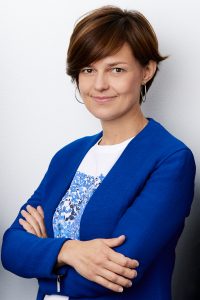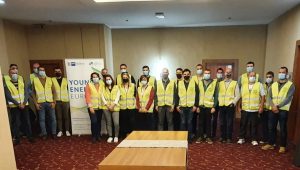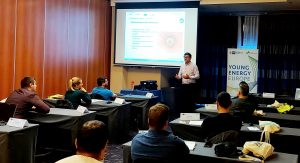Many companies are aware of their potential for energy efficiency and are very open to this form of education. Especially because the focus is on practical application in companies, says Daniela Buntak, Young Energy Europe Project Manager from the German-Croatian Chamber of Industry and Commerce. The goal of the Young Energy Europe Project is to improve measures to adapt to climate change in companies. The German-Croatian Chamber of Industry launched a project titled Young Energy Europe, which helps young professionals from various industries to recognize and utilize the potentials for energy efficiency and reduction of CO2 emissions.

1. What exactly is this project and what are its specifics?
— Education is special in its structure and content. The first part refers to four-day lectures that provide basic knowledge in the field of energy – from energy management in companies, through climate protection and e-mobility to the efficient use of technologies in the field of water and waste management and the calculation of CO2 savings. In order to facilitate the practical implementation of the energy efficiency project, topics such as project management, internal communication and teamwork, as well as the use of metering devices are covered. The lecture is followed by a period of several weeks during which energy scouts prepare and implement their own project to save energy and avoid CO2 emissions in their respective companies. In the last module, participants present their practical projects in a joint workshop and are evaluated by an expert jury. In the end, all energy scouts receive certificates, and the best of them are awarded by the jury.
The Young Energy Europe Project was launched by the European Climate Initiative and is implemented
by the Federal Ministry of the Environment, Nature Conservation and Nuclear Safety of the Federal Republic of Germany. The project is coordinated by our umbrella Association and its subsidiary DIHK Service GmbH, and aside from us, it is also implemented by the German Trade Chambers Abroad in Bulgaria, the Czech Republic, Greece, Hungary, Poland, Slovakia and Serbia. In these countries, more than 339 Energy Scouts from 135 companies completed the training and 143 practical projects were designed, most of which were implemented. As a result of these projects, 26,600 tons of CO2 are saved annually. In the next three years, the goal is to train more than 480 energy scouts in these eight countries.
2. What is the end goal of the project and does it have a time limit? How important is international
cooperation for topics like these?
— The project started in Croatia on April 1, 2021, and will be implemented until March 2024. In that period, we will conduct three cycles of education. Europe has recognized the great potential of climate
protection: it is not only ecologically necessary, but serves the purpose of technological progress: it promotes innovation, opens new markets, attracts investment and ultimately creates new jobs. Climate protection also generates many positive side effects such as reduced energy costs in companies, but also in households, or better air quality in cities, which ultimately has a positive impact on people’s health.

3. To what extent do young professionals recognize themselves in all these topics and what are
they most interested in?
— Young professionals are aware that even small changes can lead to big changes at the organizational level. Due to the high costs of energy and raw materials, as well as the increasing focus on environmental
protection, they focused on resource and energy efficiency and implement environmental protection and energy management policies by engaging in energy management activities and raising energy efficiency awareness within their own companies, and in addition to the fact that companies want to reduce
energy costs, the image they gain through sustainable and socially responsible operations is very important to them. Given the range of topics of this education, but also the heterogeneity of the participants, it is difficult for me to single out something that interests them the most. From conversations with participants, we can often conclude that it is difficult for them to single out one area, and they realize that all business segments hide opportunities for optimization and energy efficiency.
4. When it comes to this topic, what difficulties do young professionals face, but also the German-
Croatian Chamber of Industry and Commerce as the institution that has recognized this topic?
— Energy management in companies is a lengthy process and many organizations that choose to take that step think they can do it overnight. Reduction of consumption is achieved by systematic monitoring and management of processes and activities, and the first problems appear already at the beginning, when the company must present data on energy consumption and prices paid for energy. Many simply have not yet established any kind of monitoring. Young professionals full of ideas and suggestions often face the problem of how to best present possible measures to the management, without the story ending with the question “what is the payback period” and therefore this training includes lectures in this area. Projects from countries where education has been conducted for the last three years often show that a financial investment is not always necessary, and simple measures such as turning off the lights, avoiding unnecessary printing, etc. are enough to achieve energy efficiency. Ultimately, synergies are needed between company management, technical staff, and all employees to achieve optimal results.
5. What are the benefits of this education and what is it that you pay special attention to when working with the students?
— In this training, energy scouts learn how to identify energy wasters in their own companies and what specific measures could reduce energy costs in the long run. A great benefit to companies is that this training, including the materials, is free, and participants eventually receive a certificate confirming their participation in the training as well as acquiring the title of Energy Scout. It is especially important for us to approach each company individually, because although they have some problems and challenges in
common, each of them must find the right model to achieve energy conservation. In doing so, participants benefit from the experiences of other companies and thus get ideas for their own new projects or solving problems they encounter in their work.

6. What would you single out as the biggest challenges when it comes to business, education of young people and all this in connection with energy conservation and reduction of CO2 emissions?
— In the past few years, through our various projects, we were able to conclude that there is an awareness of energy efficiency and environmental protection in Croatia. Many of our member companies confirm this with their examples of the use of renewable energy sources, waste separation and other measures. However, the biggest challenge that companies face is the lack of time to educate their employees, which indicates a general problem, which is the lack of manpower or skilled labor. An additional current challenge is the lack of equipment and long delivery times of goods due to problems caused by difficulties in the supply chain as a result of well-known reasons related to the COVID-19 pandemic. Namely, companies that have already decided on changes in terms of energy and want to replace obsolete systems and implement new ones, currently have a problem that due to the disrupted supply chain, lack of raw materials and production delays, they cannot reach these technologies.
7. What is your cooperation with decision makers, but also with business entities in the field? How much do they recognize the importance of such projects?
— Many companies are aware of their potential for energy efficiency and are very open to this form of education. Especially since the focus is placed on practical application in companies. Without a major marketing campaign, we were able to fill the group for the first cycle of lectures. However, we know that in public administration there are also huge opportunities for energy efficiency, especially when it comes to energy efficiency in construction, from heating, cooling through hot water preparation to lighting. We want to attract local self-governments, i.e. cities and their utility companies, counties and other public institutions, to participate in this project. Therefore, I would like to take this opportunity to invite
all those interested to contact us now and book their place for the next training, which will take place in April next year.